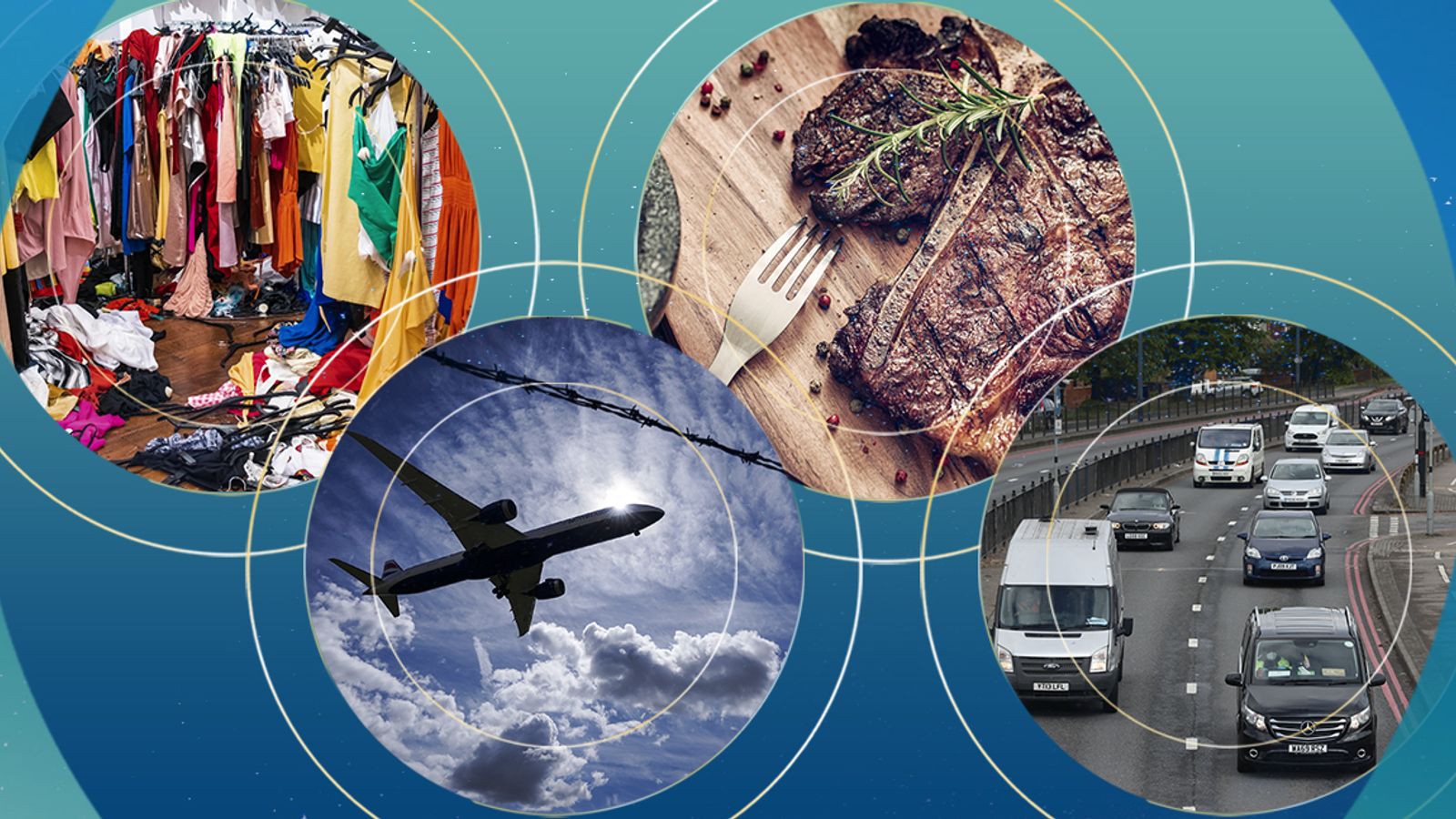The United Nations has warned the planet will reach its global warming limit within the next 20 years, causing irreversible environmental damage and more extreme weather events.
Its latest report calls for “rapid and large scale reductions in greenhouse gas emissions”, urging people to treat climate change as an “immediate threat”.
Lead author Professor Ed Hawkins, an expert in climate science at the University of Reading, stresses that “every tonne of CO2 and every bit of warming matters”.
This means that every action – from one person changing their behaviour to governments changing their policies – counts.
Climate activist Greta Thunberg echoed the calls for everyday change, tweeting: “We can still avoid the worst consequences.”
So although it may seem daunting, there are easy steps you can take to help prevent climate change. Here Sky News looks at six of them.
The average carnivore diet produces 7.2kg of carbon dioxide a day, almost twice as much as a vegetarian diet.
Livestock is responsible for around 15% of world emissions and, according to researchers at the University of Oxford, adopting a vegan diet is one of the best ways to reduce your impact on the environment.
Researcher Joseph Poore says that by freeing up farmland to grow more trees, worldwide veganism would reduce greenhouse gases by 13 million tonnes over 20 years, which would amount to a 25% cut in global emissions.
Professor Bill Collins, one of the lead authors of the UN report, told Sky News that 0.5C of the warming we have seen in recent years is caused by methane from cows.
“That’s really difficult to reduce without changing our diets,” he said.
But by lowering methane levels we can not only stop the planet getting hotter, we can actively lower global temperatures, he added.
If you are not able to cut out meat completely, chicken production produces around a third of the CO2 per kilogram of protein than beef and lamb.
So swapping red meat for poultry or cutting out dairy products will still make a difference.
The coronavirus pandemic proved just how much vehicle pollution adds to our carbon footprint.
During various lockdowns in 2020, UK greenhouse gas emissions fell by 8.9% – from 454.8 million tonnes in 2019 to 414.1 million – the biggest drop since records began in 1990.
Transport accounts for around a third of total emissions in Britain and toxic fumes from cars, vans and lorries cause thousands of premature deaths every year.
So opting for public transport or car-sharing to get around will help lower your carbon footprint considerably.
The government is banning any new petrol and diesel cars from 2030, but before then, if you’re able to travel by electric bus or tram – or have your own electric car – this is the best option for the planet.
Overall greenhouse gases also fell as a result of air travel being ground to a halt during the pandemic.
The aviation industry is responsible for 2% of all human-induced CO2 emissions, according to the Air Transport Action Group.
But while reducing unnecessary air travel will make a difference, climate campaign group Possible claims that a small minority of frequent flyers are the ones causing the real damage.
They say 70% of all flights in the UK are taken up by the same 15% of people, with the vast majority on higher incomes.
As a result, they want a frequent flyer levy introduced to deter people who can afford to fly more often from doing so.
Professor Collins explains that while you can electrify cars, you can’t do the same with planes. So the only way to reduce emissions from air travel is to fly less often.
From Greta Thunberg to Extinction Rebellion, climate change activists have used social media to make their campaigns go global.
But you don’t need to be part of a group to advocate for climate change.
In terms of what to share on your social media channels, Professor Collins told Sky News: “It’s helpful to point out the consequences of climate change.
“The fires that we’re seeing in Greece, the floods in Germany.
“It’s important to show people that climate change isn’t just some abstract notion, these extreme weather events are literally killing people.”
Our taste for fast, cheap and disposable fashion is hurting the environment.
The textile industry requires a huge quantity of water and dozens of toxic chemicals, resulting in vast amounts of water and air pollution.
This year it was revealed that the UK buys more clothes than any other country in Europe.
And campaigners Fashion Revolution have also criticised big brands for failing to declare their carbon footprints, meaning many are going unchecked.
While that is up to them, there are a number of things you can do to limit the impact of your fashion choices.
Buying clothes second hand, selling or repurposing those you no longer want, and limiting how often you buy new items will all help.
Avoiding fast-delivery options will also help reduce the clothing company’s carbon footprint and doing your research on which brands are more sustainable – for example ones that use electric delivery vans or produce their clothes in the UK – is another way to take action.
Although it is often pushed as the best thing you can do to help the planet, recycling has its own environmental implications.
Transporting and processing waste for recycling requires a lot of energy, which means higher CO2 emissions.
A previous Sky News Dirty Business report found thousands of tonnes of British recycling is shipped around the world only to end up in landfill.
So before you recycle, look to see if you can reduce and reuse first.
This means, reducing the amount of single-use plastic products you buy and focusing on items that you can reuse before you put them in the recycling bin.
Reusable coffee cups, water bottles and carrier bags are all good examples, as well as “upcycling” unwanted goods.
According to Greenpeace UK just 20 fossil fuels companies are responsible for a third of all our greenhouse gas emissions put together.
So while cutting out meat and single-use plastic helps on an individual level, the government and big businesses are the ones that can make bigger changes faster.
Head of climate at Greenpeace UK Kate Blagojevic told Sky News: “As well as cutting down on meat and flying, anyone wishing to make a difference might want to consider getting involved in campaigns that put pressure on governments and big polluters to act.
“Small steps from individuals are all well and good, but what we desperately need right now are big steps from business and political leaders.”
Joining environmental campaign groups, charities and protests will remind those in power of their responsibilities for the climate.
On top of the government’s pledge to get to zero net emissions by 2050, around three quarters of local councils in the UK have “declared a climate emergency”.
This commits their areas to making environmental changes at local level and lobbying the government to honour their promise.
You can write to your MP and local councillors to find out more about what is being done where you live.
Subscribe to ClimateCast on Spotify, Apple Podcasts, or Spreaker.
Sky News has launched the first daily prime time news show dedicated to climate change.
The Daily Climate Show is broadcast at 6.30pm and 9.30pm Monday to Friday on Sky News, the Sky News website and app, on YouTube and Twitter.
Hosted by Anna Jones, it follows Sky News correspondents as they investigate how global warming is changing our landscape and how we all live our lives.
The show also highlights solutions to the crisis and how small changes can make a big difference.






















